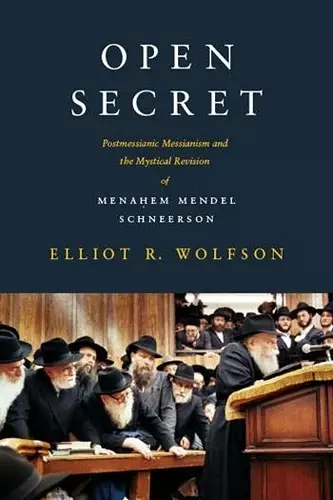Open Secret
Postmessianic Messianism and the Mystical Revision of Menaḥem Mendel Schneerson
Format:Hardback
Publisher:Columbia University Press
Published:13th Nov '09
Currently unavailable, and unfortunately no date known when it will be back

Menahem Mendel Schneerson (1902-1994) was the seventh and seemingly last Rebbe of the Habad-Lubavitch dynasty. Marked by conflicting tendencies, the thinker was a radical messianic visionary who promoted a conservative political agenda, a reclusive contemplative who built a hasidic sect into an international movement, and a man dedicated to the exposition of mysteries who nevertheless harbored many secrets. Schneerson astutely masked views that might be deemed heterodox by the canons of orthodoxy while engineering a fundamentalist ideology that could subvert traditional gender hierarchy, the halakhic distinction between permissible and forbidden, and the social-anthropological division between Jew and Gentile. Elliot R. Wolfson concentrates on Schneerson's apocalyptic sensibility and promotion of a mystical consciousness that undermines all discrimination. Situating Habad thought within the evolution of kabbalistic mysticism, the history of Western philosophy, and Mahayana Buddhism, he articulates Schneerson's rich theology and profound philosophy, concentrating on the nature of apophatic embodiment, semiotic materiality, hypernomian transvaluation, nondifferentiated alterity, and atemporal temporality.
Menahem Mendel Schneerson (1902-1994) was the seventh and seemingly last Rebbe of the Habad-Lubavitch dynasty. Marked by conflicting tendencies, Schneerson was a radical messianic visionary who promoted a conservative political agenda, a reclusive contemplative who built a hasidic sect into an international movement, and a man dedicated to the exposition of mysteries who nevertheless harbored many secrets. Schneerson astutely masked views that might be deemed heterodox by the canons of orthodoxy while engineering a fundamentalist ideology that could subvert traditional gender hierarchy, the halakhic distinction between permissible and forbidden, and the social-anthropological division between Jew and Gentile. While most literature on the Rebbe focuses on whether or not he identified with the role of Messiah, Elliot R. Wolfson, a leading scholar of Jewish mysticism and the phenomenology of religious experience, concentrates instead on Schneerson's apocalyptic sensibility and his promotion of a mystical consciousness that undermines all discrimination. For Schneerson, the ploy of secrecy is crucial to the dissemination of the messianic secret. To be enlightened messianically is to be delivered from all conceptual limitations, even the very notion of becoming emancipated from limitation. The ultimate liberation, or true and complete redemption, fuses the believer into an infinite essence beyond all duality, even the duality of being emancipated and not emancipated--an emancipation, in other words, that emancipates one from the bind of emancipation. At its deepest level, Schneerson's eschatological orientation discerned that a spiritual master, if he be true, must dispose of the mask of mastery. Situating Habad's thought within the evolution of kabbalistic mysticism, the history of Western philosophy, and Mahayana Buddhism, Wolfson articulates Schneerson's rich theology and profound philosophy, concentrating on the nature of apophatic embodiment, semiotic materiality, hypernomian transvaluation, nondifferentiated alterity, and atemporal temporality.
Elliot R. Wolfson's new work is a masterful exposition of the phenomenology and ontology of Habad thought, particularly its bearing on messianic mysteries and consciousness. This study is an extraordinary integration of precise philology, philosophical comprehension, and the inner course of Habad theosophy as it flows through the discourses of its seven masters. Wolfson analyzes the climactic position of Rabbi Schneerson within this complex with exemplary and original insight. -- Michael Fishbane, Nathan Cummings Professor of Jewish Studies, University of Chicago Elliot R. Wolfson's dark brilliance is itself an open secret, unfolding mesmerizing rhythms of chiastic paradox. The relevance of his commentary cannot be confined to the study of a particular movement, religion, or discipline. In this philosophical meditation on a controversial strand of recent messianism, a profound historical kabbalism appears edged with a postmodern Kafkaesque irony--in the legacy of a 'future that is already present as the present that is always future.' -- Catherine Keller, Drew University, and author of Face of the Deep: A Theology of Becoming This highly original reading of Menachem Mendel Schneerson's messianic doctrine renders irrelevant much of the ongoing speculation and debate on the question of whether or not the Lubavitcher Rebbe, like the bulk of his following, believed that he was the Messiah. The book argues insightfully that beneath his well-attested endeavors to demonstrate the imminence the messianic advent, and his resort to the traditional language of Jewish messianic speculation, lays the paradoxical 'open secret' of a totally impersonal Messiah who, reflecting the nature of the infinite kabbalistic godhead itself, can be revealed in the world only by way of concealment. His advent is conceptualized as a universal expansion of spiritual consciousness, a nonevent that continuously occurs, has occurred, and will occur 'immediately, without delay, in actuality,' which effectively means beyond measurable time. -- Ada Rapoport-Albert, University College London Wolfson's spiritual quest is contagious, and the intrepid reader will brave the many difficult passages in order to follow him -- Lawrence Grossman Forward Every researcher or enlightened reader should be interested in this profound construction, in order to understand the most significant Jewish messianic phenomenon in the Jewish world of the last two generations. -- Alon Dahan H-Judaic Wolfson has not only produced an excellent study of Rabbi Mena?em Mendel Schneerson's views, but he has argued convincingly that this work will serve as a paradigm for Jewish philosophic thought. -- H.D. Uriel Smith Philosophy East and West
ISBN: 9780231146302
Dimensions: unknown
Weight: unknown
472 pages